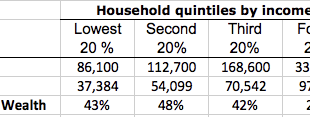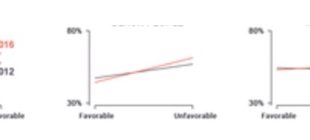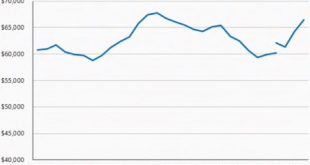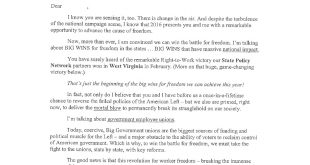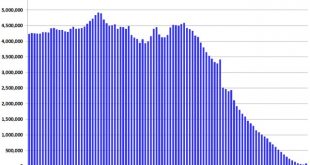by Peter Dorman (originally published at Econospeak) Gentrification This is the bane of urban development, right? Old housing stock, built for yesterday’s working class, is spiffed up and priced far out of reach of today’s regular folk. High end shops replace hardware stores, bric-a-brac recyclers and appliance repair centers; a tide of designer coffee flushes out the cheap, refillable kind. Who can afford to live there? But wait! Those refurbished old...
Read More »Insanely Concentrated Wealth Is Strangling Our Prosperity
Dan here…Angry Bear Steve Roth’s clear and thorough writing continues…please go to the original for more graphs…I could not include the largest in the Angry Bear format in its proper place. Go straight to read more to view the whole post…. By Steve Roth (originally published at Evonomics) Insanely Concentrated Wealth Is Strangling Our Prosperity Remember Smaug the dragon, in The Hobbit? He hoarded up a vast pile of wealth, and then he just hung out in...
Read More »Insanely Concentrated Wealth Is Strangling Our Prosperity
Dan here…Angry Bear Steve Roth’s clear and thorough writing continues…please go to the original for more graphs…I could not include the largest in the Angry Bear format in its proper place. Go straight to read more to view the whole post…. By Steve Roth (originally published at Evonomics) Insanely Concentrated Wealth Is Strangling Our Prosperity Remember Smaug the dragon, in The Hobbit? He hoarded up a vast pile of wealth, and then he just hung out in...
Read More »A thought for Sunday: the most important issue in the 2016 election was…
A thought for Sunday: the most important issue in the 2016 election was . . . This is a post I’ve been meaning to write for several months. For a while after the election last year, there was a debate about whether the “economic anxiety” in the (white) working class was the most important factor vs. was it simply a matter of racism. The consensus has nearly settled on the narrative that racism was decisive, to the point where “economic anxiety” has...
Read More »A thought for Sunday: the most important issue in the 2016 election was…
A thought for Sunday: the most important issue in the 2016 election was . . . This is a post I’ve been meaning to write for several months. For a while after the election last year, there was a debate about whether the “economic anxiety” in the (white) working class was the most important factor vs. was it simply a matter of racism. The consensus has nearly settled on the narrative that racism was decisive, to the point where “economic anxiety” has...
Read More »The asterisk in real median household income
The asterisk in real median household income This is a follow-up to the post I wrote last week about the latest data on real median household income. One of the things I notes is that “households” includes the millions that are composed of retirees, a burgeoning demographic due both to healthier longevities and the demographics of the Boomer generation. This morning Jared Bernstein helpfully includes a graph of real median household income excluding...
Read More »‘A once-in-a-lifetime chance to reverse the failed policies of the American left’
Via the Guardian comes this note from well funded groups: Conservative campaign aims to strike ‘mortal blow’ on government unions ‘A once-in-a-lifetime chance to reverse the failed policies of the American left’
Read More »Carbon Gridlock Redux in Washington State
byPeter Dorman (originally published at Econospeak) Carbon Gridlock Redux in Washington State A year ago—it already seems like another era—an initiative to set up a carbon tax in Washington State, I-732, was defeated by the voters. The proposal was to use the money for tax reductions in accordance with the standard economic view that taxing “bads” rather than goods generates a double dividend. I disagree with that (I think the deadweight loss case...
Read More »Hurricane workarounds for industrial production and housing
Hurricane workarounds for industrial production and housing Hurricane Harvey has already affected some of the August data releases. Irma has already started to affect some weekly releases, and will undoubtedly affect the September monthly releases. I have already begun to adjust for the hurricanes in the case of initial jobless claims. But what of the monthly data? While there is nothing so timely and precise as backing out affected states from the...
Read More »2.5 cheers for 2016’s new high in real median income!
Given that I consider jobs and wages for average Americans my #1 focus, it’s only fair that I write about this week’s release of the real median household income for 2016, don’t you think? A few years ago I wrote that real median household income was the most misused statistic in the entire econoblogosphere. That’s because: it is NOT a measure of real wages. It includes all income — things like pensions, dividends, and social security. it...
Read More » Heterodox
Heterodox

